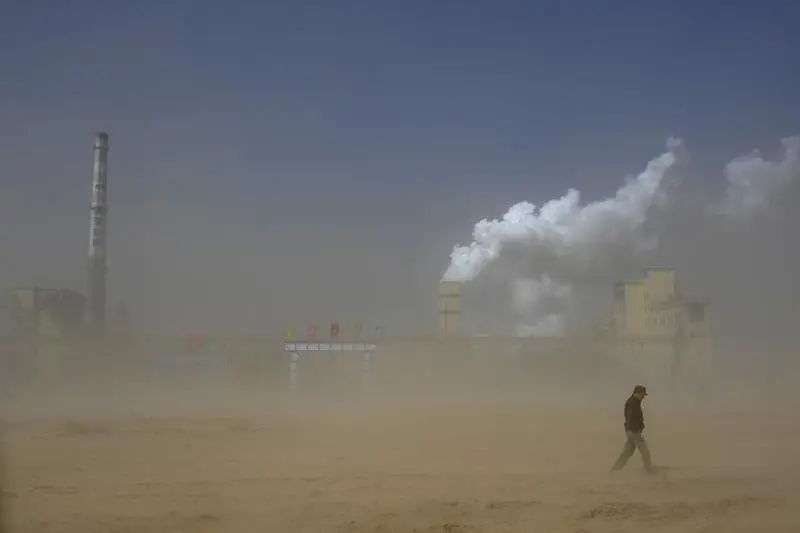PHOTO
GLASGOW- U.N. conference host Britain said 77 countries had pledged to phase out coal, dirtiest of the fossil fuels that drive global warming, as a study showed the carbon dioxide they release into the atmosphere had rebounded to near pre-pandemic levels.
"We were expecting to see some rebound," said the study's lead author Pierre Friedlingstein, a climate modelling researcher at the University of Exeter. "What surprised us was the intensity and rapidity of the rebound."
Alok Sharma, British president of the COP26 conference in Glasgow, said the two-week meeting was on its way to gradually ending use of the world's most widely used fuel - for which demand is set to hit a new record this year.
He said on Thursday 77 countries had signed a pledge to phase out coal-fuelled power plants - which produce more than 35% of the world's electricity - and stop building new ones.
"Today I think we can say that the end of coal is in sight," Sharma told the conference.
He said progress had been rapid since 2019: "Who'd have thought, back then, that today we are able to say that we are choking off international coal financing or that we would see a shift away from domestic coal power"
But the hurdles to reach the United Nations goal of "net zero" global emissions by 2050 are still enormous.
Many developing countries, not least China, India and Indonesia, rely on cheap, accessible coal and other fossil fuels to grow, despite their disadvantages to the environment and health.
INDIA, CHINA ABSENT
The British government said on Wednesday it expected 190 nations and organisations to sign the non-binding pledge, in which richer countries would phase out coal power before 2040, and poorer countries before 2050.
But the list published on Thursday left out both India and China, which is home to almost half the over 2,600 coal-fired plants operating or under construction around the world.
Poorer countries are certain to demand financial help from developed nations as the price of ending their reliance on coal - and richer countries have failed to meet a promise of providing $100 billion a year in "climate finance" by 2020.
"We need to have funding to retire coal earlier and to build the new capacity of renewable energy," said Sri Mulyani Indrawati, finance minister of Indonesia, which is the world's biggest coal exporter and relies on coal for 65% of its energy.
It committed in the agreement to phasing out coal power generation - but not to ending financing of new plants.
There are signs of initiatives to address the funding issue. On Tuesday, countries including Britain and the United States announced an $8.5 billion partnership to help South Africa phase out coal faster.
But the International Energy Agency, the world's energy watchdog, this year said to achieve the U.N. goal of 'net zero' emissions by 2050, no new fossil fuel projects should be approved after 2021 - a goal the latest pledge is sure to miss.
The main aim of COP26 is to get promises of enough cuts in greenhouse gas emissions to put the world on a clear path towards limiting the rise in global temperature - already up 1.1C since pre-industrial times.
The United Nations says a rise above 1.5C would tip the Earth into potentially irreversible climate effects that would dwarf the intensifying storms, heatwaves, droughts and floods that it is already experiencing.
EMISSIONS REBOUND
In 2020, carbon dioxide emissions fell by a record 1.9 billion tonnes - a 5.4% drop - as countries locked down and economies ground to a halt because of the coronavirus pandemic. The new report, produced by the Global Carbon Project, forecasts emissions will rise by 4.9% this year.
At least 20 countries plan to commit at the summit on Thursday to stop public financing for fossil fuel projects abroad by the end of next year, according to two people familiar with the talks.
Banks and other financial institutions including the ADB, Citi and HSBC are also expected to step up by announcing financial mechanisms to help countries quit coal.
More countries also may join the Beyond Oil and Gas Alliance, led by Denmark and Costa Rica. That effort commits members to phasing out fossil fuel production within their own borders, but it will not formally be launched until next week.
There was a sharp reverse, however, for one of the most eye-catching announcements of the conference - a pledge by more than 100 world leaders to halt and reverse deforestation and land degradation by the end of the decade.
Indonesia, home to huge tropical rainforests, said Monday's agreement was at odds with its own development plans.
In 2019 alone, an area of Indonesian forest and other land half the size of Belgium was burned for palm oil plantations.
"Forcing Indonesia to zero deforestation in 2030 is clearly inappropriate and unfair," Environment Minister Siti Nurbaya Bakar, who attended the summit, said in a tweet.
(Additional reporting by Katy Daigle, William James, Andrea Januta, Noah Browning, Fathin Ungku, Stanley Widianto; Writing by Kevin Liffey; Editing by Janet Lawrence) ((richard.valdmanis@thomsonreuters.com; +1 617 312 6022; Reuters Messaging: richard.valdmanis.thomsonreuters.com@reuters.net))





















